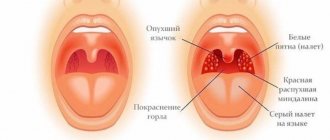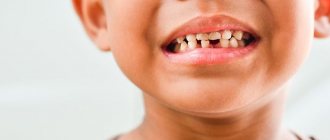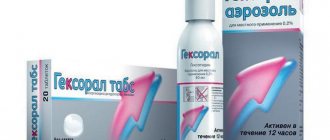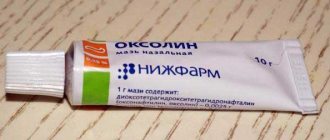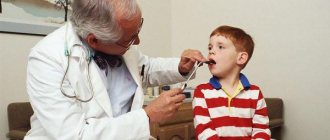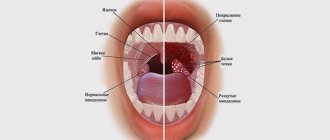Herpangina is one of the most common viral diseases in children. Almost everyone experiences this disease in childhood, although this diagnosis also occurs in adults. From a scientific point of view, the very name “herpetic sore throat” was incorrectly given to the disease. Previously, the disease was little studied. Scientists, noticing the similarity of rashes during the disease with those of herpes, came to the conclusion that the causative agent of the disease was the herpes virus, and gave the disease a name that has stuck and is found in the medical literature in exactly this form. Although the disease has nothing in common with herpes infection. It has been established that the cause of herpetic sore throat is enteroviruses - Coxsackie viruses of groups A and B and ECHO viruses (echoviruses). In medical reference books you can find different versions of the names of this disease: aphthous tonsillitis, vesicular pharyngitis, herpetic tonsillitis, herpangina, etc.
As already mentioned, children under ten years of age are at risk: infants, preschoolers and children of primary school age. The severity of the disease depends on the age of the child. The disease is most severe in children in the first year of life. Preschoolers are more often infected because at this age they do not pay due attention to hygiene, have contact with animals and are often in children's groups. To become infected, it is enough to eat unwashed fruit. This should also include the immaturity of immunity at an early age. The disease is highly contagious, and often its outbreaks become epidemic. It is noteworthy that this disease does not occur in babies in the first months of life - the antibodies found in mother's milk create some kind of immunity to herpangina.
One can trace the obvious seasonality of herpetic sore throat: the peak occurs in summer and autumn. As a rule, having been ill once, a child becomes immune to re-infection, so this disease is less common among adolescents and adults.
Infection can occur in one of three ways:
- airborne
- contact
- fecal-oral.
With the airborne method, infection occurs by sneezing, coughing, or talking with a carrier of the virus. In case of contact - through discharge from the nasopharynx. With the fecal-oral method - through dirty hands, through unwashed food, toys and pacifiers, which is especially typical for children.
Even a recovering person can still spread the infection around him for about a month, so it is believed that herpes sore throat is highly contagious: a child can easily become infected in kindergarten from a baby who does not even have obvious symptoms of the disease. If one family member gets sick, most likely everyone will suffer from the disease.
How does infection spread throughout the body? First, the virus from the nasopharynx reaches the intestinal lymph nodes through the lymph flow. Already in the intestines, the virus gains strength and enters the blood, and severe inflammation begins in the oropharynx.
Symptoms of the disease
Herpes sore throat in a child does not manifest itself for seven to fourteen days. This is the incubation period for the disease. Then symptoms appear that are similar to those of other infectious diseases: acute respiratory infections, acute respiratory viral infections, influenza, intestinal infections - therefore, at the initial stage, herpetic sore throat is difficult to diagnose:
- high temperature up to 40°C
- severe sore throat, sore throat, cough
- Gastrointestinal disorders (vomiting, diarrhea, abdominal pain)
- muscle pain
- enlarged lymph nodes in the neck
- In infants, convulsions are possible.
Abdominal pain and digestive disorders are associated with the activity of enteroviruses in the intestines that cause herpes sore throat - they affect the intestinal and stomach mucosa, thereby disrupting their functioning. On the second or third day of illness, a characteristic rash appears on the palate and tonsils, similar to blisters with liquid. The appearance of these rashes is a sign that we are dealing with herpetic sore throat. When these bubbles burst, they form ulcers, which create discomfort and pain in the mouth. A child experiencing severe sore throat may refuse not only food, but also drink. Increased salivation is possible, since the receptors that affect saliva production are constantly irritated.
If the baby has a weak immune system, the formation of bubbles can occur in several “passes” and with a break of two to three days, accompanied by a repeated increase in temperature and symptoms of intoxication. There are cases when rashes appear on the legs, arms and body, but not on the face.
The fever usually subsides on the third to fifth day, and mouth ulcers disappear within a week. When the peak of the disease passes, the child feels significant relief - improvement occurs on the sixth or seventh day after the appearance of the first symptoms. But we must remember that for a certain period the child remains a source of infection! One of the differences between herpes sore throat and acute respiratory infections is the absence of nasal discharge, although swelling of the mucous membrane is present. Also, outbreaks of acute respiratory infections and acute respiratory viral infections in the summer, as a rule, do not happen, which cannot be said about this type of sore throat. In summer, heat contributes to the rapid spread and high activity of enteroviruses, and the number of cases of herpangina increases accordingly.
Normally, herpetic sore throat in children lasts from eight to ten days.
Dear parents! Diagnosis and treatment of herpetic sore throat in children must be carried out under the supervision of an otorhinolaryngologist, since it is not always possible to make a correct diagnosis on your own (due to the similarity of the initial symptoms of the disease with other viral diseases). Failure to start proper treatment on time can result in a protracted illness and complications!
Acute and chronic laryngitis
What can you do if you have a sore throat and lost your voice?
Acute and chronic laryngitis: symptoms and treatment in adults and children
Laryngitis is “ubiquitous.” It affects teachers and students, lecturers and students, singers, announcers and those whose profession is not associated with vocal strain. It appears in the cold season, when, having frozen or wet feet, the next morning you feel a telltale sore throat. Again, laryngitis and its symptoms interfere with life. Or in the summer you enjoy the coolness of the air conditioner, drink cold water and then wonder why your throat hurts and your voice has disappeared. More than 2,000,000 residents of Russia, according to official statistics, get sick every year. And almost half of them are children, in whom acute laryngitis often causes serious complications.
When to see a doctor? And when will it “go away on its own”?
Many people ignore the symptoms. Just think, your throat is sore, your voice has sunk and it’s painful to swallow. Just something to do. Type “laryngitis symptoms and treatment” into a search engine, a couple of tablets, at best, gargle, drink hot tea, and go to work.
However, with laryngitis, everything can go according to a different “scenario”. For example, when the infection spreads down the mucous membrane of the respiratory tract, tracheitis begins, then bronchitis. And they take much longer and are more expensive to cure. Therefore, if your condition does not improve or worsens within a few days, consult a doctor.
Moreover, rush to talk to your doctor if a rash appears due to laryngitis, pain radiates to the ear, a severe cough bothers you and it is difficult to breathe.
If complications arise, such as false croup or laryngeal stenosis, minutes count. This often happens in children under 8 years of age. Even in the evening, the symptoms of laryngitis in children are minor, and at night patients begin to cough, turn blue and choke. You need to call an ambulance, go to the hospital to relieve the attack, treat inflammation of the larynx.
The course of the disease during a viral and bacterial process is rarely limited to the larynx. Neighboring areas are involved and pharyngitis, tracheitis, and bronchitis begin.
How to recognize acute laryngitis? Symptoms in adults and children
If:
- My throat is sore, burning, something is bothering me.
- My throat is dry.
- It became painful to swallow.
- The cough bothers me - first dry, then with phlegm.
- The voice is hoarse or has disappeared altogether.
- The temperature increased to 37.5-38°C.
- If you feel weak or have a headache, call a doctor and get treatment. “Feat of labor” and going to work in this state can cost you dearly.
Call immediately if it is very painful and difficult to swallow, or if you are coughing up blood.
Laryngitis in children, especially young children, develops faster, the temperature is higher, and the condition is more severe. And if difficulty wheezing or a “barking” cough develops, false croup may develop, and you must urgently go to the hospital.
What are the causes of acute laryngitis symptoms?
Due to the introduction of infection, swelling and inflammation of the larynx appears. The following are “to blame” for the disease:
- Influenza viruses, parainfluenza, adenovirus.
- The causative agents of “childhood” infections are measles, diphtheria, whooping cough.
- Bacteria - strepto- and staphylococci. They occur against the background of acute respiratory viral infections or chronic infections, such as tonsillitis.
Chronic laryngitis: symptoms in adults. How to understand why your voice is hoarse
If episodes of acute inflammation are repeated frequently, the process becomes chronic.
The temperature is normal, when there is no exacerbation, the general condition does not change. Patients are concerned about dryness, sore throat, hoarse voice, deep throat, and constantly want to clear their throat. When an exacerbation occurs, the symptoms of chronic laryngitis intensify.
Inflammation of the larynx rarely occurs as an independent disease. More often it accompanies other conditions. For example, it is a concern for chronic tonsillitis, sinusitis, bronchitis, reflux disease - the reflux of acidic stomach contents into the esophagus.
Other causes of chronic laryngitis:
- smoking and alcohol,
- air polluted with dust, smoke, industrial emissions,
- allergens,
- increased vocal load on the voice,
- specific infection - syphilis, tuberculosis.
- chronic diseases (diabetes mellitus, circulatory failure, etc.)
The reasons are different, the symptoms are similar. Therefore, without eliminating the cause, searching for “how to treat chronic laryngitis at home” and then gargling with “herbs” and dissolving lozenges is, at a minimum, ineffective.
Who treats - which doctors should I contact?
First of all, if you have a sore throat, lost your voice, have a dry cough, or have other unpleasant sensations, you should make an appointment with an otolaryngologist
. However, there are situations when the participation of other specialists, for example, a gastroenterologist, is necessary in diagnosis and treatment.
How to diagnose laryngitis?
Survey
First, the specialist asks what is bothering you. Tell us in detail about your sore throat, cough, and other uncomfortable sensations. Be sure to report if you have a fever, muscle pain, weakness, or headache.
Next, the otolaryngologist will ask you how long you have had these symptoms and what you did, what medications you took to get rid of them. Be sure to let us know if you smoke, breathe dry, dusty air, have a strained voice, or have allergies.
If you have already had laryngitis, the treatment of which did not give the desired result, you have been tested - take the card and test results with you. Doctors at the Energo clinic with many years of experience take into account all the details in order to make an accurate diagnosis and prescribe adequate treatment.
Initial examination
During a general examination, it is noticeable that the patient’s voice has changed.
During an ENT examination of the larynx (laryngoscopy), the doctor sees redness of the laryngeal mucosa throughout, or only in the area of the vocal folds. It is not difficult for an experienced doctor to diagnose laryngitis, the signs of which are thickening, swelling and incomplete closure of the vocal folds.
With chronic inflammation, changes are of a different kind. Depending on the form of chronic laryngitis, the mucous membrane may be reddened and thickened, covered with viscous mucus, and the vocal folds may not close completely. Patients complain of soreness and discomfort in the throat, cough with sputum that is difficult to cough up. Chronic laryngitis in children, the treatment of which is a task for an experienced doctor, manifests itself in exactly this way.
In another form, the mucous membrane grows excessively, and singing “nodules” form on the vocal folds. The main complaint is loss of voice. With atrophy, the mucous membrane becomes thin, covered with crusts, and patients are bothered by a dry, painful cough.
What methods are used for diagnosis?
In most cases, a simple laryngoscopy is sufficient. If there is a suspicion of a bacterial or fungal cause of laryngitis, a smear and bacteriological culture are done.
How to treat laryngitis?
At the first stage of treatment, the doctor decides on the tactics. For acute process and chronic inflammation, treatment is different. This depends on many factors - the form of the disease, the severity of general symptoms, concomitant pathology. The doctor prescribes drugs for the treatment of laryngitis in adults: anti-inflammatory, antiviral, antiseptics, immunomodulators, physiotherapy, according to the form of the disease and concomitant pathology. For a dry, obsessive cough, medications that suppress the cough reflex are prescribed for a short course. You shouldn't prescribe them to yourself. Do you want to know how to quickly cure laryngitis? Follow these rules. During the acute period:
What to do
- Take your medications as prescribed by your doctor.
- Do alkaline (soda solution) inhalations for laryngitis.
- Avoid spicy, sour, hot foods.
- Drink enough fluids.
- Humidify the indoor air.
What not to do
- Don't talk, even in a whisper.
- Do not smoke.
- Don't drink alcohol.
In case of exacerbation of a chronic process, treatment is carried out depending on the form of the disease.
For mucosal atrophy, these are things that improve blood circulation and metabolism: physical procedures, vitamins, biostimulants. If the process is accompanied by thickening of the mucosa, anti-inflammatory drugs are needed.
For catarrhal form, antiallergic and decongestant drugs, expectorants, antiseptics, anti-inflammatory drugs and alkaline inhalations are used.
Plus, gentle mode.
If you are looking for how to treat laryngitis in children, remember: the main thing is not to waste time. All processes in a child’s body proceed much faster, and complications may arise.
At the second stage of treatment, the doctor evaluates the effect of the treatment. With a chronic process, it takes time to get the effect. Be patient and follow your doctor's recommendations.
At the third stage of treatment, after there is a positive result from the treatment, the doctor prescribes a set of measures to prevent exacerbation. Necessary:
- Treat diseases that support laryngitis: pharyngitis, tonsillitis, bronchitis, diseases of the gastrointestinal tract, diabetes, etc.
- Eliminate factors that provoke exacerbation - stop smoking, reduce contact with ARVI patients if possible, humidify the air.
- Take medications prescribed by your doctor: vitamins and medications to increase general and local immunity.
At the fourth stage of treatment, the doctor determines the frequency of follow-up examinations and studies in order to monitor your condition and notice a relapse in time.
What results can be expected from laryngitis treatment?
- Itching and dryness disappear
- Voice is restored
- The cough stops
- The general condition is normalized.
Prevention of laryngitis
Spicy
- Adhere to a healthy lifestyle - eat right, don’t get nervous, get enough rest, walk in the fresh air, humidify the indoor air.
- Treat acute respiratory viral infections in a timely and correct manner, do not endure them “on your feet,” and do not allow the process to become chronic.
- Strengthen the immune system: hardening, courses of vitamins, herbal remedies.
- Eliminate factors that have a harmful effect on the mucous membrane of the respiratory tract - smoking, alcohol, dust, allergens.
Chronic
- Eliminate factors causing exacerbation.
- Don't get too cold.
- Try to eliminate foci of chronic infection - treat teeth, sinusitis, tonsillitis, bronchitis in a timely manner.
If your throat is sore, hoarse, or your voice has disappeared or you have a cough, you should not wait for laryngitis to “go away on its own.”
The inflammation often spreads further, and more serious diseases will need to be treated. Making an appointment with a doctor and being treated by a specialist is easier than eliminating a chronic process or its complications. Call and schedule a visit. Or make an appointment with our otorhinolaryngologists online on the website.
Possible complications.
More often, the disease passes without dangerous consequences for the patient. But with weak immunity, especially in young children, severe herpes sore throat can lead to serious complications caused by the spread of the virus to other organs:
- serous meningitis
- heart pain, myocarditis
- pyelonephritis
- encephalitis
- conjunctivitis.
To exclude the development of serous meningitis, you need to consult a neurologist; if you have heart complaints, you need to contact a pediatric cardiologist. If there are changes in the general urine test, you must make an appointment with a pediatric nephrologist.
With proper and effective treatment of herpes sore throat complicated by meningitis, the prognosis is usually favorable. But at the same time, the treatment of the youngest patients requires careful attention. With myocarditis the situation is more severe. Any complications of herpetic sore throat require the intervention of specialists!
Scarlet fever: symptoms and signs
The disease begins acutely, with a sharp rise in temperature. Headache, muscle and joint pain, body aches, rapid heartbeat, and general weakness increase. Intoxication can cause vomiting.
The tonsils, arches, pharynx and palate are excessively red, sometimes a coating appears like a sore throat (whitish, gray, purulent). The jaw and parotid lymph nodes become inflamed and enlarged, swallowing becomes painful and difficult. On days 4-5, the tongue becomes bright crimson with hypertrophied papillae.
Atypical forms of scarlet fever:
- extrabuccal - the pathogen penetrates through damaged skin, a purulent-necrotic focus is formed at the site of penetration with a most concentrated rash around, the pharynx is not affected;
- erased (in adults) - with symptoms of mild to moderate respiratory infection;
- scarlet fever with toxic-septic shock - develops more often in adulthood with severe cardiovascular and renal complications.
What type of rash occurs with scarlet fever depends on the nature of the infection and the age of the patient. In typical cases, the first elements of the rash appear on the 1-2 day in the face, upper torso, then on the elbows, groin folds. The nature of the rash is multiple dark dots turning into dark red stripes. Sometimes the elements merge into a large erythema (redness of a large area). On the face, rashes are observed on the forehead, temples, and cheeks.
Treatment of herpes sore throat in children
There is no specific antiviral treatment. Treatment of the cause of herpetic disease should be carried out according to the following scheme:
- isolation of the patient
- drinking plenty of fluids, bed rest
- actions aimed at relieving and alleviating symptoms.
At the moment, no drug has yet been invented that can kill the causative agent of the disease. You can only alleviate or remove the symptoms. A person recovers completely only when the body develops immunity to the virus. Usually the body takes a week to do this.
First of all, it is advisable to isolate the child from other family members - separate dishes, linen and towels - the disease is contagious. For herpetic sore throat, children are prescribed antihistamines to relieve swelling and irritation. "Claritin", "Suprastin" and others are suitable. To reduce the temperature, use antipyretics: Nurofen, Efferalgan, Paracetamol, etc. To relieve pain in the throat, gargle with decoctions of sage, chamomile, calendula, salt or soda solution. Rinsing should be done every hour. You can use special sprays and aerosols: Hexoral, Ingalipt, Tantum-Verde. Tablets and lozenges relieve pain. It is advisable to use the antiseptic agents Miramistin and Chlorhexidine.
For successful recovery it is necessary to create favorable conditions for the child. It is necessary to provide conditions for sleeping in a well and frequently ventilated room. The diet should consist of soups, purees, and cereals. Food should not be hot so as not to irritate a sore throat. Don't forget about drinking plenty of warm drinks. The patient can be given rosehip decoction, tea with jam or honey.
Note to parents! In case of herpes sore throat, do not inhale, warm up or apply compresses under any circumstances. Such measures will only activate viruses, and the disease will drag on.
Some parents mistakenly lubricate the bubbles in the larynx with iodine or brilliant green. This measure is absolutely ineffective, does not bring any practical benefit, but causes severe pain to the baby.
There is no need to give your child antiherpetic drugs such as Acyclovir and its analogues. As we have already mentioned, the course of the disease has nothing to do with the herpes virus.
